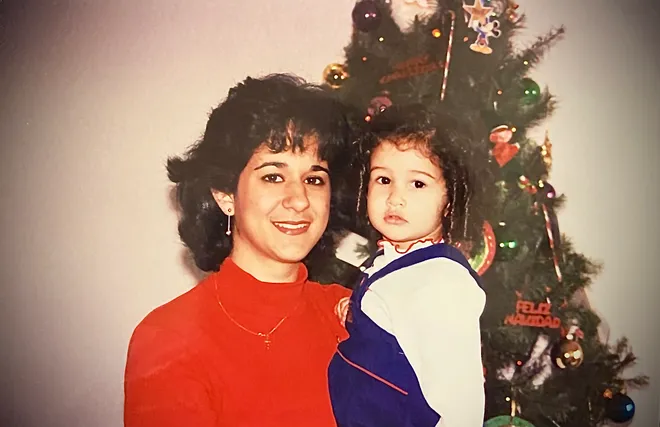Yes, that’s Martha Stewart at 14. Why holiday nostalgia is healthy.
There’s a special magic in the air during the holiday season that, for lack of better words, hurts so good. When the pine tree sales spring up around town and holiday-themed commercials air on TV, a wistful longing for the memories of Christmases past pools in the pit of my stomach in a weird warm and fuzzy yet unnerving kind of way.
Ask any psychologist, and they’ll call it nostalgia. I call it confusion.
Nostalgia has always been an ambivalent emotional experience, so much so that it used to be considered a disease of the brain or mind. It’s why whenever I reminisce about playing with Tamagotchis with my cousin on Noche Buena or opening presents on Christmas morning, I feel a tinge of sadness followed by a fondness for the moments that made holidays so special as a kid.

As an adult, the holidays feel different. Family gatherings are smaller (#drama), malls this time of year look like ghost towns (thanks, Jeff Bezos) and gift exchanges consist of text messages to my brothers about when an Amazon package will be delivered to their homes more than 1,200 miles away (thanks, Jeff Bezos?).
I know I'm not alone. Martha Stewart got nostalgic recently when she shared a photo of herself celebrating Christmas at 14 years old. "This picture of me at 14 was taken by my father in front of the Kostyra tree," Stewart said. "I am all decked out in holiday finery – my first formal dress, sewn at home by Mother and me: ice-blue taffeta with a pink net overlay and pink tulle gloves!"
Although dwelling on the past has its downsides, decades of research show that nostalgia’s net effect on our psychological well-being is overwhelmingly positive – boosting mood, improving self-esteem, encouraging connection with others, increasing meaning in life and inspiring optimism about the future.
“Nostalgia is an emotional cocktail of positive and negative feelings. We tend to think of nostalgia as turning inward, like you’re withdrawing from life, but it’s actually energizing and is a critical ingredient in keeping holiday traditions alive,” said Clay Routledge, an existential psychologist and author of “Past Forward: How Nostalgia Can Help You Live a More Meaningful Life.” “It has a self-regulatory effect where even though you may feel sad or stressed, nostalgia reminds us that life is bigger than this one moment.”

Want to get into the holiday spirit?You can watch 'A Charlie Brown Christmas' for free this weekend. Here's how to stream it.
Holidays are powerful triggers of nostalgia because they are rooted in ritual and tradition, which studies have found to bring families together and reduce anxiety and depression.
Naturally, the holidays take many of us to childhood, when Santa was real and school teachers played the Polar Express ahead of a two-week break. Now, I worry about maxing out credit cards paying for gifts and scheduling paid time off.
Reflecting on how easy and fun the holidays were in childhood isn’t all that bad though, according to Krystine Batcho, a psychologist and professor at Le Moyne College in New York who has been studying nostalgia for nearly 30 years.
“It's helpful psychologically and emotionally because childhood represents, for most people, an ideal,” Batcho said. “It includes the best that humans have to offer one another, like trust and unconditional love.”
Kaitlyn Paige can relate. Since starting college, Paige has begun to mourn her childhood, developing a “disdain” toward this time of year now that her parents have handed over the holiday magic baton.
“My parents can’t take me to holiday activities like they did when I was a kid,” the 20-year-old Syracuse University student said. “I realized that I had to take it into my own hands in order to create some of that holiday cheer as an adult, which doesn't mean it’s not fun anymore. It’s just different.”

Paige, who wrote about her newfound holiday responsibility for her university’s student newspaper, The Daily Orange, said she now makes an effort to decorate her apartment and set up Secret Santa gift exchanges with friends to spark holiday spirit.
“There’s a little bit of negative because some of the magic is gone,” Paige said, “but I try to focus on the fact that I was very privileged to have these experiences as a kid. Not everyone can reflect back on their childhood and have such positive memories.”
The holiday season is typically a time of celebration and joy, but for many people, it’s anything but that. Death, divorce, childhood abuse, a recent layoff – there may be more reasons to dread than enjoy the holidays, but reflecting on a complicated past can help you more than you might assume.
Nostalgia during difficult times “doesn’t magically make you feel happy, but it’s comforting and correlated with healthy coping strategies,” Batcho said. “Rather than relying on something like alcohol as a substitute for emotional comfort, nostalgia reminds people that they got to where they are because they kept fighting, they kept reaching out to other people and they kept being open to the idea that others can offer them guidance, wisdom and support.”
A complicated past may encourage you to make new memories you wish you made as a child and to find a life lesson to hold on to. “Time puts us in a better position to extract the value out of an experience that was challenging as a way to be more thankful and more optimistic,” Routledge said.
In doing so, people may paint a more rosy picture of their childhood, choosing, maybe without realizing it, to ignore the negative – a coping strategy that some may see as a weakness or problem, but one that Batcho considers an evolutionary attempt at survival.
“It helps us thrive because when we edit our past to make it better than it was, it gives us better aspirational goals,” Batcho said. “Nostalgia isn’t about the benefit of going backward, it’s about the benefit of knowing where you want to go when you move forward as you borrow the best of the past.”
And borrow the best of the past I will. Cheers to new memories, stronger connections and very happy holidays to come.

Disclaimer: The copyright of this article belongs to the original author. Reposting this article is solely for the purpose of information dissemination and does not constitute any investment advice. If there is any infringement, please contact us immediately. We will make corrections or deletions as necessary. Thank you.







